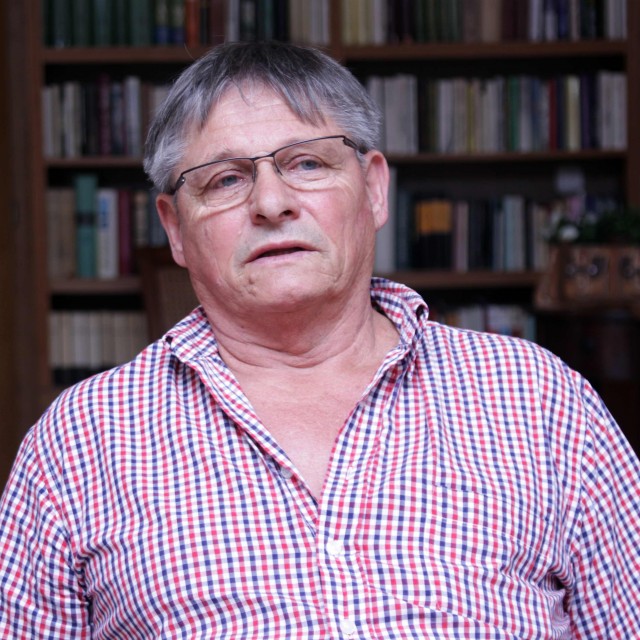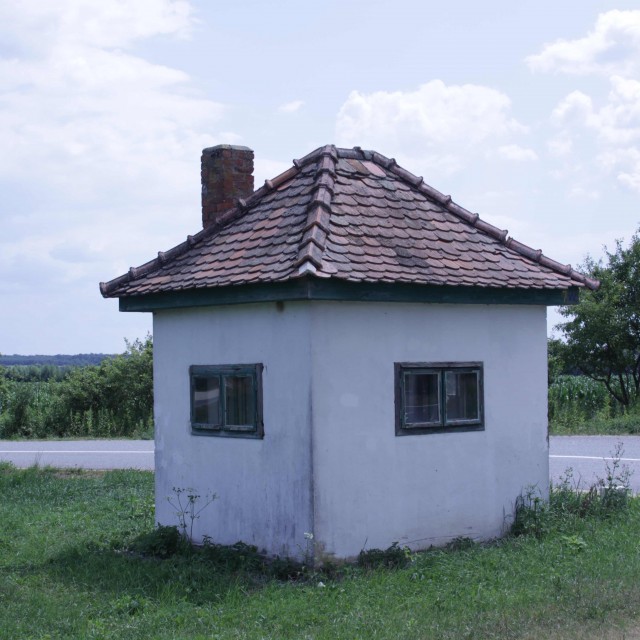Hoeing with an identity card with us
Ferenc Schlaffer was born in Pornóapáti, a Hungarian village which was in the border zone. He continued to live there until he reached majority at the age of 18. Then following the example of several people from his village, he climbed up the fencing and jumped off on the other side of the frontier. He arrived suddenly to Deutsch Schützen. As a local inhabitant, Ferenc Schlaffer knew well the structure of the border defence and its weaknesses. In Pornóapát: "the inhabitants of the village were living between two fences of wire." A fencing of wire separated the Hungarian municipality from Austria, but the more efficient means of defence, among them the electric fence, had been built on the eastern side of the village. This defended Pornó "against those who arrived from the outside, that is against those Hungarians who came one at a time towards the west.” Patrols controlled often the passengers in the railway station of the nearby city, Szombathely. The number of the identity cards was especially checked. "Number 1 was given to those who lived in Vas county very close to the frontier. Pornóapáti for example was in this region. Then Szombathely or Nára were number 2. Farer you lived in the country, the bigger number you had on your passport,” Schlaffer recalled. You could ask a permission to enter the border zone from the Ministry of the Interior, but those who applied for it, their reasons and in general their activity in the border zone was strictly controlled by the political police. "Also local people of Pornó was obliged to have their identity card with them, the 500 meter-permission in it to everywhere they went in the village, if they went to the field to work, to hoe. You had to have it in your pocket or in your bag in case you had to show it, to proof you were a local inhabitant,” he recalled. The whole village was severely controlled. On the real border line, in contrast with other parts of the Iron Curtain, it was impossible to create a strong defence line, for example of mines, because the Austrian and Hungarian villages were very close one to the other and there was big the risk of an unintentional accident.
Hodnocení
Abyste mohli hodnotit musíte se přihlásit!
Útvonalak
Még nem tartozik egyetlen útvonalhoz sem.
Hozzászólások

Ferenc Schlaffer
Ferenc Schlaffer was born in the Hungarian village Pornóapáti in 1950. His native village is some meters off the border between Austria and Hungary and in those days it was inhabited by mostly Germans. Also his family was of German origin, thus they spoke German language at home, too. His parents earned their living from the land they possessed. His mother, Anna Éder, was a housewife who first worked in their private land, later in the cooperative. His father, János Schlaffer, was an independent smallholder for a while, later he got a job at the forestry. His family planned several times to leave the country because of the poverty and the injuries they had to sustain during the reprisals against the Germans considered to be guilty for the war crimes. They lost their family house as well as a part of their land. Ferenc Schlaffer attended his schools in Pornóapáti and in the near village of Felsőcsatár. Then he went to Szombathely and he studied in an industrial school to be a skilled roofer. He finished school in 1968 and he was employed at Vasép, (Iron Constructions), in Szombathely. He worked there for a couple of months, then he decided to leave Hungary just some days after he had turned 18. He returned home after a work shift, he handed over his wage to his mother and he directed himself to the border fence which was some hundred meter off their family house. He climbed up the fencing and jumped over to Austria. He jumped off in Deutsch Schützen. On the Austrian side of the border Ferenc Schlaffer went to the border station, he was brought to Eisenberg. Later he was transported to a refugee camp in Traiskirchen. First he wanted to go to live in the United States of America, but at the end he changed his mind and he remained in Austria. Nevertheless he was officially banished from Austria for four years, he didn’t have to leave the country. He lived in Traiskirchen and he worked as a roofer in Wien for different companies. After a while he succeeded to move to Wien, too. He was given the Austrian citizenship in 1980 and he could visit Hungary at the first time after his emigration. He had an Austrian wife, but later they divorced. He lived together with another Austrian woman and they had a child. His daughter Natalia died in 2005. In 1989, he remarried. His second wife is Erzsébet Gunyhó, of Szombathely. She works in Austria as a nurse while Ferenc Schlaffer has already retired. The couple lives both in Wien where they rent a flat and in Szombathely where they have a family house.




